formerly eScholarship Editions


|
|
|
|
Your request for similar items found 20 book(s). | Modify Search | Displaying 1 - 20 of 20 book(s) | |
| 1. | 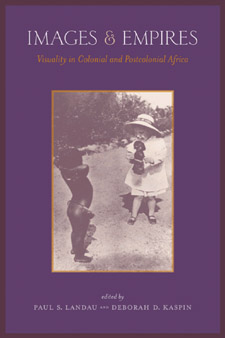 | Title: Images and empires: visuality in colonial and postcolonial Africa Author: Landau, Paul Stuart 1962- Published: University of California Press, 2002 Subjects: Anthropology | African Studies | Art History | Cultural Anthropology | History Publisher's Description: Figurative images have long played a critical, if largely unexamined, role in Africa - mediating relationships between the colonizer and the colonized, the state and the individual, and the global and the local. This pivotal volume considers the meaning and power of images in African history and culture. Paul S. Landau and Deborah Kaspin have assembled a wide-ranging collection of essays dealing with specific visual forms, including monuments, cinema, cartoons, domestic and professional photography, body art, world fairs, and museum exhibits. The contributors, experts in a number of disciplines, discuss various modes of visuality in Africa and of Africa, investigating the interplay of visual images with personal identity, class, gender, politics, and wealth. Integral to the argument of the book are over seventy contextualized illustrations. Africans saw foreigners in margarine wrappers, Tintin cartoons, circus posters, and Hollywood movies; westerners gleaned impressions of Africans from colonial exhibitions, Tarzan films, and naturalist magazines. The authors provide concrete examples of the construction of Africa's image in the modern world. They reveal how imperial iconographies sought to understand, deny, control, or transform authority, as well as the astonishing complexity and hybridity of visual communication within Africa itself. [brief] Similar Items |
| 2. | 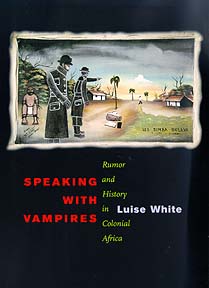 | Title: Speaking with vampires: rumor and history in colonial Africa Author: White, Luise Published: University of California Press, 2000 Subjects: African Studies | African History | African Studies | Cultural Anthropology Publisher's Description: During the colonial period, Africans told each other terrifying rumors that Africans who worked for white colonists captured unwary residents and took their blood. In colonial Tanganyika, for example, Africans were said to be captured by these agents of colonialism and hung upside down, their throats cut so their blood drained into huge buckets. In Kampala, the police were said to abduct Africans and keep them in pits, where their blood was sucked. Luise White presents and interprets vampire stories from East and Central Africa as a way of understanding the world as the storytellers did. Using gossip and rumor as historical sources in their own right, she assesses the place of such evidence, oral and written, in historical reconstruction. White conducted more than 130 interviews for this book and did research in Kenya, Uganda, and Zambia. In addition to presenting powerful, vivid stories that Africans told to describe colonial power, the book presents an original epistemological inquiry into the nature of historical truth and memory, and into their relationship to the writing of history. [brief] Similar Items |
| 3. | 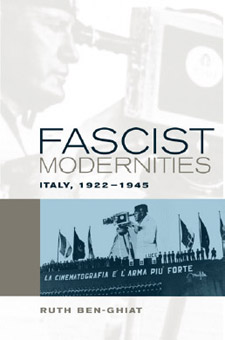 | Title: Fascist modernities: Italy, 1922-1945 Author: Ben-Ghiat, Ruth Published: University of California Press, 2001 Subjects: European Studies | History | Intellectual History | European History Publisher's Description: Ruth Ben-Ghiat's innovative cultural history of Mussolini's dictatorship is a provocative discussion of the meanings of modernity in interwar Italy. Eloquent, pathbreaking, and deft in its use of a broad range of materials, this work argues that fascism appealed to many Italian intellectuals as a new model of modernity that would resolve the contemporary European crisis as well as long-standing problems of the national past. Ben-Ghiat shows that - at a time of fears over the erosion of national and social identities - Mussolini presented fascism as a movement that would allow economic development without harm to social boundaries and national traditions. She demonstrates that although the regime largely failed in its attempts to remake Italians as paragons of a distinctly fascist model of mass society, twenty years of fascism did alter the landscape of Italian cultural life. Among younger intellectuals in particular, the dictatorship left a legacy of practices and attitudes that often continued under different political rubrics after 1945. [brief] Similar Items |
| 4. |  | Title: Italo Balbo: a Fascist life Author: Segrè, Claudio G Published: University of California Press, 1990 Subjects: History | European History | Autobiographies and Biographies | Politics Publisher's Description: Pioneering aviator, blackshirt leader, colonial governor, confidante and heir-apparent to Benito Mussolini, the dashing and charismatic Italo Balbo exemplified the ideals of Fascist Italy during the 1920s and 30s. He earned national notoriety after World War I as a ruthless squadrista whose blackshirt forces crushed socialist and trade union organizations. As Minister of Aviation from 1926 to 1933, he led two internationally heralded mass trans-Atlantic flights. When his aerial armada reached the U. S., Chicago honored him with a Balbo Avenue, New York staged a ticker-tape parade, and President Roosevelt invited him to lunch. As colonial governor from 1933 to 1940, Balbo transformed Libya from backward colony to model Italian province. To many, Italo Balbo seemed to embody a noble vision of Fascism and the New Italy. [brief] Similar Items |
| 5. |  | Title: How fascism ruled women: Italy, 1922-1945 Author: De Grazia, Victoria Published: University of California Press, 1992 Subjects: History | European History | Women's Studies Publisher's Description: Italy has been made; now we need to make the Italians," goes a familiar Italian saying. Mussolini was the first head of state to include women in this mandate. How the fascist dictatorship defined the place of women in modern Italy and how women experienced the Duce 's rule are the subjects of Victoria de Grazia's new work. De Grazia draws on an array of sources - memoirs and novels, the images, songs, and events of mass culture, as well as government statistics and archival reports. She offers a broad yet detailed characterization of Italian women's ambiguous and ambivalent experience of a regime that promised modernity, yet denied women emancipation.Always attentive to the great diversity among women and careful to distinguish fascist rhetoric from the practices that really shaped daily existence, the author moves with ease from the public discourse about femininity to the images of women in propaganda and commercial culture. She analyzes fascist attempts to organize women and the ways in which Mussolini's intentions were received by women as social actors. The first study of women's experience under Italian fascism, this is also a history of the making of contemporary Italian society. [brief] Similar Items |
| 6. |  | Title: Fascist spectacle: the aesthetics of power in Mussolini's Italy Author: Falasca-Zamponi, Simonetta 1957- Published: University of California Press, 1997 Subjects: History | European History | Popular Culture | European Studies | Politics Publisher's Description: This richly textured cultural history of Italian fascism traces the narrative path that accompanied the making of the regime and the construction of Mussolini's power. Simonetta Falasca-Zamponi reads fascist myths, rituals, images, and speeches as texts that tell the story of fascism. Linking Mussolini's elaboration of a new ruling style to the shaping of the regime's identity, she finds that in searching for symbolic means and forms that would represent its political novelty, fascism in fact brought itself into being, creating its own power and history.Falasca-Zamponi argues that an aesthetically founded notion of politics guided fascist power's historical unfolding and determined the fascist regime's violent understanding of social relations, its desensitized and dehumanized claims to creation, its privileging of form over ethical norms, and ultimately its truly totalitarian nature. [brief] Similar Items |
| 7. | 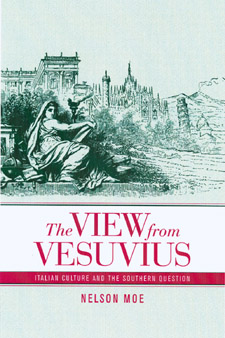 | Title: The view from Vesuvius: Italian culture and the southern question Author: Moe, Nelson 1961- Published: University of California Press, 2002 Subjects: European Studies | European History | Intellectual History | Politics | European Literature Publisher's Description: The vexed relationship between the two parts of Italy, often referred to as the Southern Question, has shaped that nation's political, social, and cultural life throughout the twentieth century. But how did southern Italy become "the south," a place and people seen as different from and inferior to the rest of the nation? Writing at the rich juncture of literature, history, and cultural theory, Nelson Moe explores how Italy's Mezzogiorno became both backward and picturesque, an alternately troubling and fascinating borderland between Europe and its others. This finely crafted book shows that the Southern Question is far from just an Italian issue, for its origins are deeply connected to the formation of European cultural identity between the mid-eighteenth and late nineteenth centuries. Moe examines an exciting range of unfamiliar texts and visual representations including travel writing, political discourse, literary texts, and etchings to illuminate the imaginative geography that shaped the divide between north and south. His narrative moves from a broad examination of the representation of the south in European culture to close readings of the literary works of Leopardi and Giovanni Verga. This groundbreaking investigation into the origins of the modern vision of the Mezzogiorno is made all the more urgent by the emergence of separatism in Italy in the 1990s. [brief] Similar Items |
| 8. | 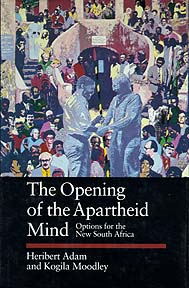 | Title: The opening of the Apartheid mind: options for the new South Africa Author: Adam, Heribert Published: University of California Press, 1993 Subjects: African Studies | Politics | African History Publisher's Description: Refusing to be governed by what is fashionable or inoffensive, Heribert Adam and Kogila Moodley frankly address the passions and rationalities that drive politics in post-apartheid South Africa. They argue that the country's quest for democracy is widely misunderstood and that public opinion abroad relies on stereotypes of violent tribalism and false colonial analogies.Adam and Moodley criticize the personality cult surrounding Nelson Mandela and the accolades accorded F. W. de Klerk. They reject the black-versus-white conflict and substitute sober analysis and strategic pragmatism for the moral outrage that typifies so much writing about South Africa. Believing that the best expression of solidarity emanates from sympathetic but candid criticism, they pose challenging questions for the African National Congress and Nelson Mandela. They give in-depth coverage to political violence, the ANC-South African Communist Party alliance, Inkatha, and other controversial topics as well.The authors do not propose a solution that will guarantee a genuinely democratic South Africa. What they offer is an understanding of the country's social conditions and political constraints, and they sketch options for both a new South Africa and a new post-Cold War foreign policy for the whole of southern Africa. The importance of this book is as immediate as today's headlines. [brief] Similar Items |
| 9. | 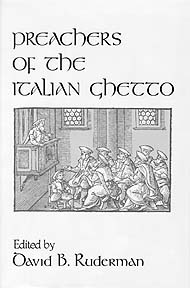 | Title: Preachers of the Italian ghetto Author: Ruderman, David B Published: University of California Press, 1992 Subjects: Jewish Studies | Medieval History | European History | History Publisher's Description: By the mid-sixteenth century, Jews in the cities of Italy were being crowded into compulsory ghettos as a result of the oppressive policies of Pope Paul IV and his successors.The sermons of Jewish preachers during this period provide a remarkable vantage point from which to view the early modern Jewish social and cultural landscape.In this eloquent collection, six leading scholars of Italian Jewish history reveal the important role of these preachers: men who served as a bridge between the ghetto and the Christian world outside, between old and new conventions, and between elite and popular modes of thought. The story of how they reflected and shaped the culture of their listeners, who felt the pressure of cramped urban life as well as of political, economic, and religious persecution, is finally beginning to be told. Through the words of the Italian ghetto preachers, we discover a richly textured panorama of Jewish life more than 400 years ago. [brief] Similar Items |
| 10. | 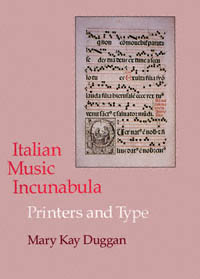 | Title: Italian music incunabula: printers and type Author: Duggan, Mary Kay Conyers Published: University of California Press, 1992 Subjects: Music | Musicology | Medieval Studies Publisher's Description: Musical notation presented unusual challenges to the new craft of printing in the fifteenth century. Its demands were so difficult that the first impression of music from metal type was not made until a full twenty years after the first printed alphabetic texts. By the end of the century dozens of such fonts had appeared throughout Europe. The books that resulted were often impressive volumes of folio or large-folio size, printed in two colors, with woodcut illustrations.Mary Kay Duggan focuses on the technological processes developed in Italy to print music books. She begins by tracing the history and analyzing the techniques of casting and setting type and staves. She then identifies, classifies, and examines thirty-eight specific types. Finally, the author has compiled a descriptive bibliography of Italian music incunabula, including books containing either printed music or blank spaces for the insertion of manuscript music. Italian Music Incunabula marks a major advance in the study of the paleotypography of music. It greatly enhances our understanding of the impact of the printing press on music and the importance of music books in the work of early printers. Its meticulous bibliography of over 150 incunabula, concordances, and indices will make it the standard reference work for many years to come. [brief] Similar Items |
| 11. | 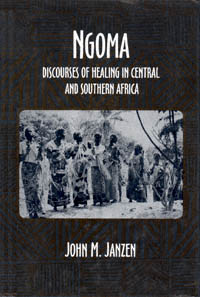 | Title: Ngoma: discourses of healing in central and southern Africa Author: Janzen, John M Published: University of California Press, 1992 Subjects: Anthropology | African Studies | Medical Anthropology Publisher's Description: Ngoma , in Bantu, means drum, song, performance, and healing cult or association. A widespread form of ritual healing in Central and Southern Africa, ngoma is fully investigated here for the first time and interpreted in a contemporary context. John Janzen's daring study incorporates drumming and spirit possession into a broader, institutional profile that emphasizes the varieties of knowledge and social forms and also the common elements of "doing ngoma ."Drawing on his recent field research in Kinshasa, Dar-es-Salaam, Mbabane, and Capetown, Janzen reveals how ngoma transcends national and social boundaries. Spoken and sung discourses about affliction, extended counseling, reorientation of the self or household, and the creation of networks that link the afflicted, their kin, and their healers are all central to ngoma - and familiar to Western self-help institutions as well. Students of African healing and also those interested in the comparative and historical study of medicine, religion, and music will find Ngoma a valuable and thought-provoking book. [brief] Similar Items |
| 12. | 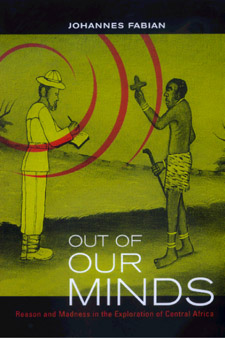 | Title: Out of our minds: reason and madness in the exploration of Central Africa: the Ad. E. Jensen lectures at the Frobenius Institut, University of Frankfurt Author: Fabian, Johannes Published: University of California Press, 2000 Subjects: Anthropology | African History | Cultural Anthropology Publisher's Description: Explorers and ethnographers in Africa during the period of colonial expansion are usually assumed to have been guided by rational aims such as the desire for scientific knowledge, fame, or financial gain. This book, the culmination of many years of research on nineteenth-century exploration in Central Africa, provides a new view of those early European explorers and their encounters with Africans. Out of Our Minds shows explorers were far from rational--often meeting their hosts in extraordinary states influenced by opiates, alcohol, sex, fever, fatigue, and violence. Johannes Fabian presents fascinating and little-known source material, and points to its implications for our understanding of the beginnings of modern colonization. At the same time, he makes an important contribution to current debates about the intellectual origins and nature of anthropological inquiry. Drawing on travel accounts--most of them Belgian and German--published between 1878 and the start of World War I, Fabian describes encounters between European travelers and the Africans they met. He argues that the loss of control experienced by these early travelers actually served to enhance cross-cultural understanding, allowing the foreigners to make sense of strange facts and customs. Fabian's provocative findings contribute to a critique of narrowly scientific or rationalistic visions of ethnography, illuminating the relationship between travel and intercultural understanding, as well as between imperialism and ethnographic knowledge. [brief] Similar Items |
| 13. |  | Title: Jewish life in renaissance Italy Author: Bonfil, Roberto Published: University of California Press, 1994 Subjects: Jewish Studies | Renaissance History | European History Publisher's Description: With this heady exploration of time and space, rumors and silence, colors, tastes, and ideas, Robert Bonfil recreates the richness of Jewish life in Renaissance Italy. He also forces us to rethink conventional interpretations of the period, which feature terms like "assimilation" and "acculturation." Questioning the Italians' presumed capacity for tolerance and civility, he points out that Jews were frequently uprooted and persecuted, and where stable communities did grow up, it was because the hostility of the Christian population had somehow been overcome.After the ghetto was imposed in Venice, Rome, and other Italian cities, Jewish settlement became more concentrated. Bonfil claims that the ghetto experience did more to intensify Jewish self-perception in early modern Europe than the supposed acculturation of the Renaissance. He shows how, paradoxically, ghetto living opened and transformed Jewish culture, hastening secularization and modernization.Bonfil's detailed picture reveals in the Italian Jews a sensitivity and self-awareness that took into account every aspect of the larger society. His inside view of a culture flourishing under stress enables us to understand how identity is perceived through constant interplay - on whatever terms - with the Other. [brief] Similar Items |
| 14. | 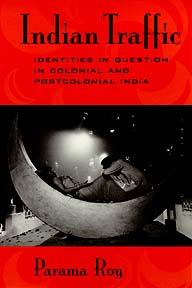 | Title: Indian traffic: identities in question in colonial and postcolonial India Author: Roy, Parama Published: University of California Press, 1998 Subjects: Postcolonial Studies | Literary Theory and Criticism | South Asia | Gender Studies Publisher's Description: The continual, unpredictable, and often violent "traffic" between identities in colonial and postcolonial India is the focus of Parama Roy's stimulating and original book. Mimicry has been commonly recognized as an important colonial model of bourgeois/elite subject formation, and Roy examines its place in the exchanges between South Asian and British, Hindu and Muslim, female and male, and subaltern and elite actors. Roy draws on a variety of sources - religious texts, novels, travelogues, colonial archival documents, and films - making her book genuinely interdisciplinary. She explores the ways in which questions of originality and impersonation function, not just for "western" or "westernized" subjects, but across a range of identities. For example, Roy considers the Englishman's fascination with "going native," an Irishwoman's assumption of Hindu feminine celibacy, Gandhi's impersonation of femininity, and a Muslim actress's emulation of a Hindu/Indian mother goddess. Familiar works by Richard Burton and Kipling are given fresh treatment, as are topics such as the "muscular Hinduism" of Swami Vivekananda. Indian Traffic demonstrates that questions of originality and impersonation are in the forefront of both the colonial and the nationalist discourses of South Asia and are central to the conceptual identity of South Asian postcolonial theory itself. [brief] Similar Items |
| 15. |  | Title: A democratic South Africa?: constitutional engineering in a divided society Author: Horowitz, Donald L Published: University of California Press, 1991 Subjects: Politics | African Studies | Sociology | Law Publisher's Description: Can a society as deeply divided as South Africa become democratic? In a most timely work, Donald L. Horowitz, author of the acclaimed Ethnic Groups in Conflict , points to the conditions that make democracy an improbable outcome in South Africa. At the same time, he identifies ways to overcome these obstacles, and he describes institutions that offer constitution makers the best chance for a democratic future.South Africa is generally considered an isolated case, a country unlike any other. Drawing on his extensive experience of racially and ethnically divided societies, however, Horowitz brings South Africa back into African and comparative politics. Experience gained in Nigeria, Botswana, Zimbabwe, and other divided societies around the world is relevant because, as South Africa leaves apartheid behind, it will still confront problems of pluralism: racial, ethnic, and ideological. Countries like South Africa, Horowitz argues, must develop institutions capable of coping with such divisions.Reviewing an array of constitutional proposals for South Africa - group rights, consociation, partition, binationalism, and an enhanced role for the judiciary - Horowitz shows that most are inappropriate for the country's problems, or else run afoul of some major ideological taboo. Institutions that are both apt and acceptable do exist, however. These are premised on the need to create incentives for accommodation across group lines. In the final chapter, Horowitz makes a major contribution to the theory of democratization as he considers how commitments to democracy might be extracted even from political groups with undemocratic objectives.Ranging skillfully across studies of social distance and stereotypes, electoral and party systems, constitutions and judiciaries, conflict and accommodation, and negotiation and democratization, Horowitz displays a broad comparative vision. His innovative study will change the way theorists and practitioners approach the task of making democracy work in difficult conditions. [brief] Similar Items |
| 16. | 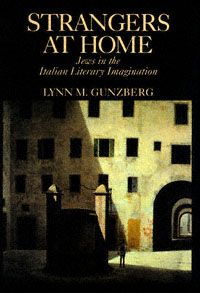 | Title: Strangers at home: Jews in the Italian literary imagination Author: Gunzberg, Lynn M Published: University of California Press, 1992 Subjects: Jewish Studies | Literature in Translation Publisher's Description: Using popular literature as a window on Italian society and its values, Lynn Gunzberg explores the representation of Jews in novels and poetry written by non-Jews from the beginning of the Risorgimento in the early 1800s to the enactment of the Fascist racial laws in 1938. She shows how the literatu . . . [more] Similar Items |
| 17. |  | Title: Siting translation: history, post-structuralism, and the colonial context Author: Niranjana, Tejaswini 1958- Published: University of California Press, 1992 Subjects: Postcolonial Studies | Literary Theory and Criticism | Southeast Asia | Cultural Anthropology Publisher's Description: The act of translation, Tejaswini Niranjana maintains, is a political action. Niranjana draws on Benjamin, Derrida, and de Man to show that translation has long been a site for perpetuating the unequal power relations among peoples, races, and languages. The traditional view of translation underwritten by Western philosophy helped colonialism to construct the exotic "other" as unchanging and outside history, and thus easier both to appropriate and control.Scholars, administrators, and missionaries in colonial India translated the colonized people's literature in order to extend the bounds of empire. Examining translations of Indian texts from the eighteenth century to the present, Niranjana urges post-colonial peoples to reconceive translation as a site for resistance and transformation. [brief] Similar Items |
| 18. | 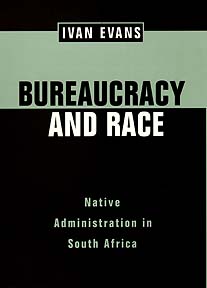 | Title: Bureaucracy and race: native administration in South Africa Author: Evans, Ivan Thomas 1957- Published: University of California Press, 1997 Subjects: African Studies | African History | Sociology | Postcolonial Studies | Cultural Anthropology Publisher's Description: Bureaucracy and Race overturns the common assumption that apartheid in South Africa was enforced only through terror and coercion. Without understating the role of violent intervention, Ivan Evans shows that apartheid was sustained by a great and ever-swelling bureaucracy. The Department of Native Affairs (DNA), which had dwindled during the last years of the segregation regime, unexpectedly revived and became the arrogant, authoritarian fortress of apartheid after 1948. The DNA was a major player in the prolonged exclusion of Africans from citizenship and the establishment of a racially repressive labor market. Exploring the connections between racial domination and bureaucratic growth in South Africa, Evans points out that the DNA's transformation of oppression into "civil administration" institutionalized and, for whites, legitimized a vast, coercive bureaucratic culture, which ensnared millions of Africans in its workings and corrupted the entire state. Evans focuses on certain features of apartheid - the pass system, the "racialization of space" in urban areas, and the cooptation of African chiefs in the Bantustans - in order to make it clear that the state's relentless administration, not its overtly repressive institutions, was the most distinctive feature of South Africa in the 1950s. All observers of South Africa past and present and of totalitarian states in general will follow with interest the story of how the Department of Native Affairs was crucial in transforming "the idea of apartheid" into a persuasive - and all too durable - practice. [brief] Similar Items |
| 19. |  | Title: Possessing nature: museums, collecting, and scientific culture in early modern Italy Author: Findlen, Paula Published: University of California Press, 1994 Subjects: History | History and Philosophy of Science | European History | Renaissance History Publisher's Description: In 1500 few Europeans regarded nature as a subject worthy of inquiry. Yet fifty years later the first museums of natural history had appeared in Italy, dedicated to the marvels of nature. Italian patricians, their curiosity fueled by new voyages of exploration and the humanist rediscovery of nature, created vast collections as a means of knowing the world and used this knowledge to their greater glory.Drawing on extensive archives of visitors' books, letters, travel journals, memoirs, and pleas for patronage, Paula Findlen reconstructs the lost social world of Renaissance and Baroque museums. She follows the new study of natural history as it moved out of the universities and into sixteenth- and seventeenth-century scientific societies, religious orders, and princely courts. Findlen argues convincingly that natural history as a discipline blurred the border between the ancients and the moderns, between collecting in order to recover ancient wisdom and the development of new textual and experimental scholarship. Her vivid account reveals how the scientific revolution grew from the constant mediation between the old forms of knowledge and the new. [brief] Similar Items |
| 20. | 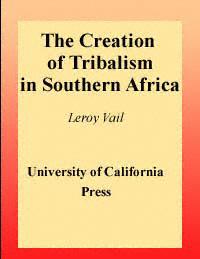 | Title: The Creation of tribalism in Southern Africa Author: Vail, Leroy Published: University of California Press, 1989 Subjects: History | African History | African Studies | Ethnic Studies Publisher's Description: Despite a quarter century of "nation building," most African states are still driven by ethnic particularism - commonly known as "tribalism." The stubborn persistence of tribal ideologies despite the profound changes associated with modernization has puzzled scholars and African leaders alike. The bloody hostilities between the tribally-oriented Zulu Inkhata movement and supporters of the African National Congress are but the most recent example of tribalism's tenacity. The studies in this volume offer a new historical model for the growth and endurance of such ideologies in southern Africa. [brief] Similar Items |